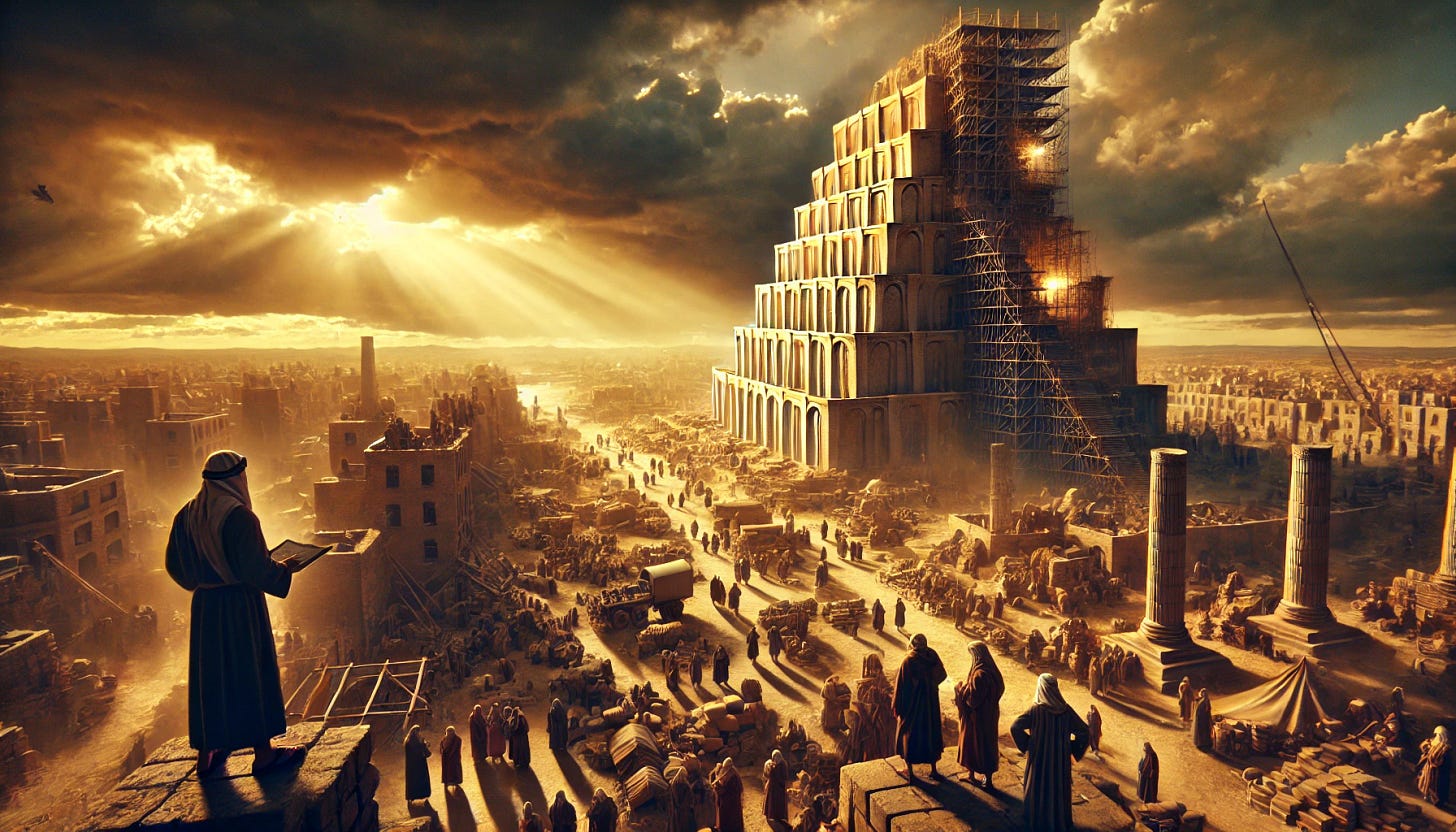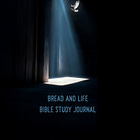Week 7: Scattered and Redeemed: The Division of Nations and God’s Plan
From Human Rebellion to Divine Restoration
Theme
The story of Babel is more than a historical account of language division; it is a reflection of humanity’s tendency toward pride, self-reliance, and defiance of divine authority. From the Table of Nations in Genesis 10 to the scattering at Babel in Genesis 11, we see a recurring theme—humanity striving for greatness apart from God, only to be reminded that His sovereignty prevails. But even in judgment, there is mercy. The scattering of nations does not end God’s plan; instead, it paves the way for redemption through Abraham and ultimately, through Christ. This lesson explores the rebellion of Babel, its consequences, and how God’s redemptive plan seeks to unify what was once divided.
Objectives
Understand the genealogies in Genesis 10 as the foundation for the division of nations.
Explore the story of the Tower of Babel as humanity’s collective rebellion against God.
Reflect on how God’s response to Babel establishes His sovereignty and sets the stage for His redemptive plan through Abraham.
Scripture Focus
Introduction
The Table of Nations and the Tower of Babel provide a foundational understanding of how humanity spread across the earth and how God remained sovereign over history. Genesis 10 records the genealogy of Noah’s sons—Shem, Ham, and Japheth—outlining the early nations that formed after the flood. However, Genesis 11 interrupts this natural development with a story of human rebellion. Instead of dispersing as commanded, people unite to build a tower to “make a name for themselves,” symbolizing humanity’s desire to define their own destiny apart from God. This act of defiance leads to divine intervention, as God confuses their language and scatters them, ensuring His plan moves forward. Yet, even in scattering, God’s purpose remains—to bring redemption through the descendants of Abraham.
The Table of Nations: The Spread of Humanity (Genesis 10)
The genealogies in Genesis 10 are more than a list of names; they are a testament to God’s design for humanity’s expansion and stewardship of the earth. Each name represents not only an individual but the birth of cultures and civilizations, forming the foundation for the world’s nations. The command to "fill the earth" (Genesis 9:1) was not merely geographical but deeply theological—humanity was to spread out, carrying the image of God into every corner of creation. However, not all sought to fulfill this divine calling. Nimrod, a powerful hunter and the first empire builder, emerges as a figure of human ambition, foreshadowing the rebellion at Babel. His legacy is one of centralized power, domination, and defiance of divine order, representing the eternal struggle between submission to God and the pursuit of self-glory. This chapter reminds us that human civilization was never intended to function apart from its Creator but to exist within His sovereign purpose, advancing His kingdom rather than exalting its own.
The genealogies in Genesis 10 reveal that God’s design for humanity is deeply relational. Each name listed is not just a historical figure but a testament to the way human beings were meant to flourish under divine guidance. These genealogies remind us that identity is not found in self-determination but in being rooted in God’s purpose. Just as nations were formed through families, so too is the Church—the redeemed people of God—called to find its identity in Christ (Galatians 3:28).
The Table of Nations provides historical evidence that supports the Bible’s reliability. While some may dismiss these genealogies as myth, archaeology and ancient texts affirm the reality of these early civilizations. The spread of humanity after the flood aligns with historical migration patterns, demonstrating that the biblical narrative is not only theological but historically grounded. This genealogical record also challenges modern individualism by showing that from the beginning, people were part of a larger divine plan (Acts 17:26).
The nations were meant to reflect God’s image and steward His creation, yet history reveals a pattern of rebellion, as seen in Nimrod’s rise to power. His ambition represents humanity’s persistent struggle between dominion under God and dominion for self. The failed legacy of human kingdoms points to the necessity of Christ’s kingdom, which alone fulfills the divine intention for humanity’s role in creation (Colossians 1:16).
This genealogy is more than a record of ancestry; it is a reflection of the unseen realm’s influence on human history. The nations that emerged carried with them spiritual allegiances, either to the Creator or to rebellious powers. The division of the world at Babel was not merely political or linguistic but spiritual, demonstrating that human history is interwoven with supernatural forces (Deuteronomy 32:8).
The Tower of Babel: Humanity’s Pride and Defiance (Genesis 11:1-4)
Rather than dispersing, humanity gathers to construct a great tower as a monument to their own glory. This act is not just architectural but theological—an attempt to elevate themselves to divine status. The phrase “make a name for ourselves” echoes later warnings against prideful ambition (Proverbs 16:18). The Tower of Babel is a symbol of human arrogance, where reliance on self replaces reliance on God, demonstrating that technological and societal advancements do not equate to spiritual wisdom.
The Tower of Babel reveals a fundamental issue in the human heart—seeking identity apart from God. The people sought to "make a name for themselves," striving for significance through achievement rather than relationship with their Creator. This mirrors the same struggle many face today: defining worth by success, status, or human approval instead of being rooted in God’s love and purpose. True identity is not found in self-promotion but in knowing and being known by God (John 15:5).
The Babel narrative challenges modern humanism, which insists that collective human effort can solve all problems. The story shows that unchecked human ambition, when separated from God, leads to disorder rather than progress. History repeatedly affirms this truth—civilizations that attempt to build greatness apart from divine wisdom ultimately fall. This passage provides a defense against the misconception that technological and societal advancements equate to moral or spiritual enlightenment (1 Corinthians 3:19).
Rather than fulfilling their divine mandate to fill the earth, the people of Babel consolidated power to defy God’s plan. This attempt to centralize authority echoes throughout history, as fallen humanity often seeks control rather than submission. The scattering at Babel, however, was not just judgment but a course correction—redirecting history toward God’s greater plan. This scattering finds its ultimate redemption in Christ, where the unity of nations is restored through Him (Revelation 7:9).
God’s Response: Confusion and Scattering (Genesis 11:5-9)
God’s decision to confuse their language is both a judgment and an act of mercy. By scattering them, He prevents humanity from uniting in deeper rebellion. This intervention does not mean abandonment; rather, it redirects history toward divine fulfillment. The scattering of Babel sets the stage for God’s call to Abraham, through whom all nations will ultimately be blessed (Genesis 12:1-3). The diversity of languages becomes a reminder that unity apart from God is futile, but true restoration is found in Christ, culminating in the reversal of Babel at Pentecost (Acts 2:5-12).
The scattering at Babel highlights the consequences of seeking identity apart from God. The people were united, but their unity was centered around self-glorification rather than divine purpose. God’s intervention was not to divide for the sake of punishment but to realign humanity’s purpose toward Him. This scattering ultimately finds resolution in Christ, where all nations and languages are united under one name—the name above all names (Philippians 2:9-10).
The division of languages at Babel is an argument against the idea that human progress alone can solve the world’s problems. The story illustrates that when humanity pursues greatness apart from God, it leads not to order but to confusion. Modern efforts to establish utopian societies without divine guidance mirror this same failure. Pentecost, where God temporarily reversed the confusion of tongues, proves that true unity is found not in human achievement but in the work of the Holy Spirit (Acts 2:5-12).
The scattering of Babel was not the end of God’s plan but the beginning of a greater mission. Through Abraham, God initiates a covenant that will one day bring redemption to all nations. What was divided in Babel is restored in Christ, where people from every tribe, tongue, and nation are brought back into divine fellowship. This grand narrative reminds us that history is not random but divinely orchestrated, leading to the fulfillment of God’s kingdom (Revelation 7:9).
The confusion of languages at Babel was not merely a human event; it was a supernatural intervention designed to limit the spread of spiritual rebellion. The division of the nations is tied to deeper theological themes, including the spiritual forces that sought to lead humanity away from God. Deuteronomy 32:8 suggests that God allotted the nations according to the number of divine beings, showing that Babel’s rebellion had cosmic implications. However, God’s ultimate plan was to reclaim the nations through Christ and bring them back under His rule (Deuteronomy 32
Exploring Key Themes
God’s Sovereignty Over Nations – The division at Babel was not random but part of God’s greater plan to shape history.
The Danger of Pride and Self-Reliance – Humanity’s downfall at Babel echoes the original sin of seeking autonomy apart from God.
God’s Mercy in Judgment – Instead of total destruction, God disperses the people, preserving them for a greater redemptive purpose.
The Promise of Unity in Christ – Pentecost serves as the ultimate reversal of Babel, showing that true unity comes through the Spirit.
Reflection and Response
What does the story of Babel teach us about pride and self-reliance?
Why did God scatter the people instead of destroying them?
How does the division of nations set the stage for God’s redemptive plan through Abraham?
What parallels can we see today in humanity’s pursuit of self-glory apart from God?
How does Pentecost in Acts 2 reflect God’s plan to restore unity in Christ?
Additional Resources
Song: “Build My Life” by Pat Barrett to reflect on building our lives on God’s foundation rather than pride. This song emphasizes surrender, trust, and aligning our lives with God’s will—an important contrast to the people of Babel, who sought to build their own legacy apart from Him. The lyrics serve as a declaration that true significance comes from relationship with God, not human ambition, reinforcing the lesson’s key theme that unity, identity, and purpose must be rooted in Him rather than in prideful self-sufficiency.
Recommended Reading: The Unseen Realm: Recovering the Supernatural Worldview of the Bible
Key Takeaways
The Table of Nations explains the origins of different people groups under God’s sovereignty.
The Tower of Babel represents humanity’s rebellion and the consequences of self-exaltation.
God’s judgment at Babel was also an act of mercy, preventing greater sin.
The scattering at Babel leads to God’s plan for redemption, culminating in Christ’s unifying work.
The story of Babel serves as a powerful reminder of the consequences of human pride and self-reliance, yet it also highlights God’s sovereignty and mercy. Though humanity sought to build a kingdom apart from Him, God intervened to prevent deeper rebellion, ensuring that His divine plan would move forward. The division of nations was not an end but a redirection—one that ultimately leads to redemption through Christ, who unites all people under His lordship. The scattering at Babel finds its fulfillment at Pentecost, where God restores unity through the outpouring of His Spirit. This lesson challenges us to examine the ways in which we seek control apart from God and calls us to place our trust in His sovereign plan, recognizing that true restoration, identity, and purpose are found in Christ alone.







